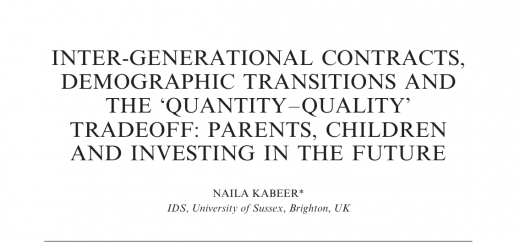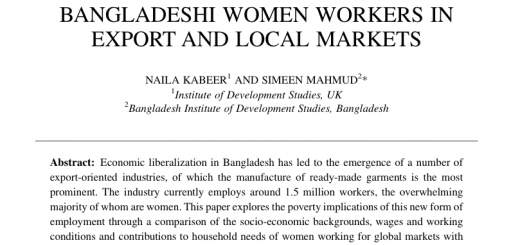New Age, Bangladesh New Year Special Issue On Heroes of Bangladesh”Making women visible….”
If there was some way to cast future generations of feminists in the Naila Kabeer mould, the foundations of patriarchy might yet crumble some day. She makes herself heard without being loud. She has strong opinions on just about everything but the way she articulates them speaks of wisdom, not belligerence. She pauses often before answering questions, and she is intelligent and intense, but never dramatic. Her salt-and-pepper hair and her sharply enunciated accent exude confidence. And best of all: for an academic of her stature, she is never pedantic or patronising. Hours before catching a plane home to Sussex, she tells me precisely, succinctly, about herself and her work.
So, what does a gender mainstreaming expert’s work involve, I ask. She shrugs it off, and laughingly says that she doesn’t really like being called that. While gender mainstreaming involves making men and women equal in society and promoting ideas and practices convincing the government to change policies, she finds that ‘convincing dogmatic bureaucrats is just too exhausting.’
As a fellow in the Institute of Development Studies at Sussex, UK — known worldwide as the leading institute for gender studies — she is a strict academic whose groundbreaking research is shedding new light on the invisible economy that women occupy.
Naila’s entry into the world of academia was strongly influenced by her mother, Rokeya Rahman Kabeer, when Rokeya went to England to research for her doctorate in history. After the family’s move to Dhaka in 1950, because of the riots in Kolkata, six-year-old Naila was initially sent off to the boarding school in Shillong, Meghalaya, and she came back to Dhaka’s reputed Holy Cross School to finish her education.
‘Those years were perhaps the best years of my life,’ Naila says. ‘I made many good friends in the college, some of who I am still in touch with. And it was a different Dhaka then. There were fewer people, open spaces. Everything felt safer.’ Her mother’s move propelled her to get a bachelor’s degree in economics from the London School of Economics, followed by a master’s from the University College London, and a post-doctoral degree back at the LSE. Her research led her to Sussex, where she is continuing work on women’s contributions to the labour market, a subject she says is important because the role is very much understated, and proper tallies of women who are out on the streets working, and those who are employed in factories, are still not accurate.
‘Going to England at that time was very different than anything I had previously experienced,’ says Naila. ‘While being on streets, where nobody stared, and you were inconspicuous, came with a heady sense of freedom, there was also the weather to deal with. I could never distinguish between seasons, and came to know that in summers you had to wear light sweaters and in winter heavier ones. To me, it was all the same. And the food was truly terrible,’ she laughs.
It was at the LSE that she met her husband, Chris Leaf. ‘We’ve been together for twenty-eight years now, and my job gives me the freedom to come back as many times as I want to Bangladesh, which means that I have two homes.’ Home for her also means family, with sister Khushi Kabeer, who Naila says is her ticket to the world of culture, which contrary to belief, is very rich in Bangladesh. ‘The year 1994 was a turning point in my life, because to my surprise, I wrote a book, which a lot of people reacted to. It meant a lot to young students all over the world, and they told me as much, and that was unexpected,’ she says. The book, Reversed Realities deals with gender hierarchies in development, and is a text that is widely used in any gender and development class. Her other book is also a scholarly work, titled Gender equality, poverty reduction and the Millennium Development Goals.
The book that was most important to Naila, however, is The power to choose, a comparison of Bangladeshi workers in both London and Bangladesh. ‘Previously, all my work had been quantitative, straightforward data analysis that was mostly theoretical and academic. This book, however, was done more on empathetic research,’ says Naila.
‘My friend, Shireen Huq, and I interviewed sixty of these women, and we were amazed at how eloquent and articulate they were. So all the analysis is done through their perspective.’
‘We had expected the average browbeaten garment worker, but these women spoke with such clarity and conviction. Working in a garments factory had been emancipation for women: for young women who were not married, it was escape from the pressure to be married, those who were married did not have to ask their husbands for money, and the divorced or the widowed had enough to be self sufficient,’ says Naila. ‘One young girl really struck me, when she said that the purdah [the observance of Islamic laws relating to women] was a state of mind: a very sophisticated argument coming from people we tend to brush off as ignorant.’
Which brings us to the obvious topic of the too obvious rise of religious fundamentalism; It bothers me,’ says Naila frankly. ‘What is more dangerous is that it is political fundamentalism, and I ask myself what its appeal is, and why people turn into fundamentalists in the first place. A lot of it has to do with the political vacuum, the disjuncture between what people have achieved, and what the politicians have delivered. Organisations such as BRAC, Gono Shashthaya Kendro, and Grameen Bank have shown that leadership is not impossible. It is very possible, and there are even isolated examples of politicians who have been great leaders, but the political culture as a whole has not been successful.’
What’s Naila Kabeer writing now? ‘I don’t have any children, my books are my children,’ she says. ‘There is always one more that you need to write. As an academic, you are forced to keep your writing style to a rather limited one and follow strict rules. I want to write a book that is more emotional, more in my tune and my voice, about the women in the global markets and how that has affected their private and public lives.’
Since her move to England, Naila used to visit Bangladesh once or twice every year. ‘A year of my life was spent in a small village in Faridpur, my ancestral home, researching for my doctoral thesis. And that year made me come back, in the true sense, to Bangladesh. The village has a smell and a rhythm that I really enjoyed. And in the villages I see the positive changes that have made the difference in a country that is still young as a democracy. The most abject signs of poverty are not visible anymore.’
‘Just this morning, I heard about something else, that also made me hopeful,’ says Naila. ‘Some of my friends were discussing a concert held at the Dhanmondi Lake, where bands were singing under a theme titled “Take back Bangladesh”. That sentiment just needs to be spread.’



